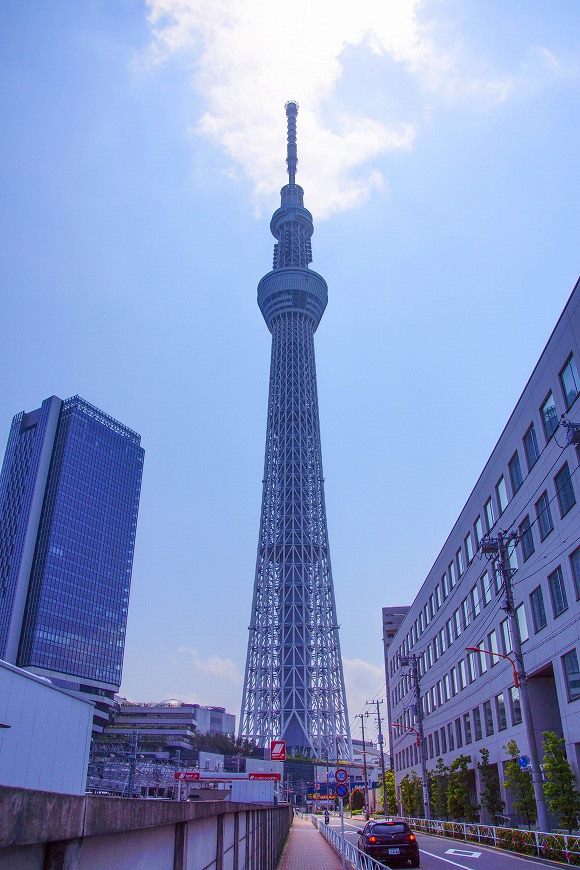
Tokyo’s Skytree was to be the answer to radio interference for broadcasting companies. Up until Skytree’s completion in May, Tokyo Tower was the tallest tower around, standing at 333 meters. Skytree, nearly double that height, stands at 634 meters.
The transfer of radio wave transmission from Tokyo Tower to Tokyo Skytree was originally planned for January of next year, but has been delayed due to an unexpected level of radio interference that will take time-consuming measures to be dealt with.
Some broadcasting companies, including NHK, have considered shutting down Tokyo Tower transmission during mid-day peak viewing periods in order to grasp the extent of the problem with transmission from Skytree. in which case, viewer confusion concerning broadcasting is to be anticipated.
TV companies broadcast from Tokyo Tower to a large area of the Kanto region. In the past 50 years since Tokyo Tower was first built, many high-rise buildings have sprung up around the tower, causing radio signal interference. To get rid of this problem and create a new and exciting tourist attraction, 65 billion yen, or $812 million US were spent on building the Skytree tower.
Skytree is over 200 meters taller than Tokyo Tower, a height that towers over the tallest buildings so that radio signal interference from surrounding buildings would, in theory, be greatly reduced. However, NHK and other private broadcasting companies cooperated in testing signals off of Skytree to get a sample of what areas could receive them. Because the radio waves were too strong, or because of antenna placement, some households received no signal, which had nothing to do with the direction or area they were in.
In order to understand the whole picture of what is going on with Skytree transmission and how to fix it, NHK would have to conduct signal testing by shutting down transmission from Tokyo Tower during daytime peak viewing times, which would cause an enormous inconvenience to viewers.
An NHK executive says, “the January transfer from Tokyo Tower to Skytree is not possible. Unlike the change over from analog to digital broadcasting, the transfer will take place in one night and testing of reception transmission has to be completed. It would be nice to be finished by May, but the excess cost is enormous.” He struggled to hide his embarrassment. The Kanto general communications Bureau’s spokesperson commented that the reception area needs to be determined and the transfer made as soon as possible.
Source: Mainiche Select News
image:Rocketnews24

 Check out the one-month electric bills for Tokyo Tower, Skytree and more!
Check out the one-month electric bills for Tokyo Tower, Skytree and more! Tokyo Tower reopens after coronavirus closure, but now you have to take the stairs 150 meters up
Tokyo Tower reopens after coronavirus closure, but now you have to take the stairs 150 meters up Restaurant by Tokyo SkyTree perfects Inari Sushi, sells nothing else for 40 years
Restaurant by Tokyo SkyTree perfects Inari Sushi, sells nothing else for 40 years Highest Starbucks in Japan set to open this spring in the Tokyo sky
Highest Starbucks in Japan set to open this spring in the Tokyo sky Skyscraper sized Pokémon cards to appear in Tokyo all year long in Tocho projection mapping event
Skyscraper sized Pokémon cards to appear in Tokyo all year long in Tocho projection mapping event Suntory now sells Yamazaki whisky cans in Japan
Suntory now sells Yamazaki whisky cans in Japan Japan has only one airport named after a samurai, so let’s check out Kochi Ryoma【Photos】
Japan has only one airport named after a samurai, so let’s check out Kochi Ryoma【Photos】 This green tea soda from Shizuoka in a sense betrayed us, but also placated us【Taste test】
This green tea soda from Shizuoka in a sense betrayed us, but also placated us【Taste test】 Beautiful blue apple jam is taking the Japanese internet’s breath away!
Beautiful blue apple jam is taking the Japanese internet’s breath away! Problem solved: How to open a Japanese convenience store onigiri rice ball【Pics and video】
Problem solved: How to open a Japanese convenience store onigiri rice ball【Pics and video】 Japanese communities giving their skylines a spring clean and saying goodbye to power lines
Japanese communities giving their skylines a spring clean and saying goodbye to power lines Spooky cosplayer dressed as Japanese urban legend ghost plays pranks on passersby in Akihabara
Spooky cosplayer dressed as Japanese urban legend ghost plays pranks on passersby in Akihabara Saitama is home to the best strawberries in Japan that you’ve probably never even heard of
Saitama is home to the best strawberries in Japan that you’ve probably never even heard of The 10 most annoying things foreign tourists do on Japanese trains, according to locals
The 10 most annoying things foreign tourists do on Japanese trains, according to locals Starbucks Japan releases new sakura goods and drinkware for cherry blossom season 2026
Starbucks Japan releases new sakura goods and drinkware for cherry blossom season 2026 Is Sapporio’s Snow Festival awesome enough to be worth visiting even if you hate the snow? [Pics]
Is Sapporio’s Snow Festival awesome enough to be worth visiting even if you hate the snow? [Pics] Japan has trams that say “sorry” while they ride around town…but why?
Japan has trams that say “sorry” while they ride around town…but why? Tokyo Skytree turns pink for the cherry blossom season
Tokyo Skytree turns pink for the cherry blossom season Japan’s new “Cunte” contact lenses aren’t pronounced like you’re probably thinking they are
Japan’s new “Cunte” contact lenses aren’t pronounced like you’re probably thinking they are Shibuya Station’s Hachiko Gate and Yamanote Line stairway locations change next month
Shibuya Station’s Hachiko Gate and Yamanote Line stairway locations change next month Yakuzen ramen restaurant in Tokyo is very different to a yakuza ramen restaurant
Yakuzen ramen restaurant in Tokyo is very different to a yakuza ramen restaurant Starbucks Japan adds new sakura Frappuccino and cherry blossom drinks to the menu
Starbucks Japan adds new sakura Frappuccino and cherry blossom drinks to the menu Japan’s newest Shinkansen has no seats…or passengers [Video]
Japan’s newest Shinkansen has no seats…or passengers [Video] Foreigners accounting for over 80 percent of off-course skiers needing rescue in Japan’s Hokkaido
Foreigners accounting for over 80 percent of off-course skiers needing rescue in Japan’s Hokkaido Super-salty pizza sends six kids to the hospital in Japan, linguistics blamed
Super-salty pizza sends six kids to the hospital in Japan, linguistics blamed Starbucks Japan unveils new sakura Frappuccino for cherry blossom season 2026
Starbucks Japan unveils new sakura Frappuccino for cherry blossom season 2026 Foreign tourists in Japan will get free Shinkansen tickets to promote regional tourism
Foreign tourists in Japan will get free Shinkansen tickets to promote regional tourism Take a trip to Japan’s Dododo Land, the most irritating place on Earth
Take a trip to Japan’s Dododo Land, the most irritating place on Earth Naruto and Converse team up for new line of shinobi sneakers[Photos]
Naruto and Converse team up for new line of shinobi sneakers[Photos] Is China’s don’t-go-to-Japan warning affecting the lines at a popular Tokyo gyukatsu restaurant?
Is China’s don’t-go-to-Japan warning affecting the lines at a popular Tokyo gyukatsu restaurant? Survey asks foreign tourists what bothered them in Japan, more than half gave same answer
Survey asks foreign tourists what bothered them in Japan, more than half gave same answer Japan’s human washing machines will go on sale to general public, demos to be held in Tokyo
Japan’s human washing machines will go on sale to general public, demos to be held in Tokyo Starbucks Japan releases new drinkware and goods for Valentine’s Day
Starbucks Japan releases new drinkware and goods for Valentine’s Day We deeply regret going into this tunnel on our walk in the mountains of Japan
We deeply regret going into this tunnel on our walk in the mountains of Japan Studio Ghibli releases Kodama forest spirits from Princess Mononoke to light up your home
Studio Ghibli releases Kodama forest spirits from Princess Mononoke to light up your home Major Japanese hotel chain says reservations via overseas booking sites may not be valid
Major Japanese hotel chain says reservations via overseas booking sites may not be valid Put sesame oil in your coffee? Japanese maker says it’s the best way to start your day【Taste test】
Put sesame oil in your coffee? Japanese maker says it’s the best way to start your day【Taste test】 No more using real katana for tourism activities, Japan’s National Police Agency says
No more using real katana for tourism activities, Japan’s National Police Agency says